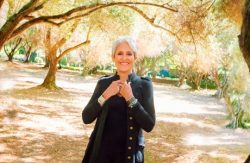 IF anything good could be said about Bristol Colston Hall’s connection to slavery (it is named after wealthy slave trader Edward Colston) it was that the audience at Joan Baez’s Fare Thee Well concert in the city was treated to one of her rare performances of No More Auction Block/O Freedom – to exorcise the building.
IF anything good could be said about Bristol Colston Hall’s connection to slavery (it is named after wealthy slave trader Edward Colston) it was that the audience at Joan Baez’s Fare Thee Well concert in the city was treated to one of her rare performances of No More Auction Block/O Freedom – to exorcise the building.
Soon after the concert began, a man shouted out “Thank you for being part of our lives!”, to cheers from the packed audience. Part of our lives IS what Joan Baez has been.
We all have our individual memories of the woman I first saw on television in 1965, singing God on Our Side. She has seldom been out of the public eye, resisting, protesting and campaigning for those very same things she talked about more than 50 years ago, and all at the same time as recording, touring and performing around the world.
Now, at the age of 77, she says that 2018 will be her last year “of formal touring” – not quite closing the window on possibilities. Her voice has, of course, altered since those early days, but she still manages the purity and those thrilling breaks that have always been signatures of her singing.
Her original guitar, an 1880 C.F. Martin 0-40, has returned to its place of honour at the Martin museum, but Joan has been playing copies of the wonderful instrument throughout her career.
Like so many performers these days, she has an assistant who tunes between songs saving the audience from lengthy gaps so as to enjoy the maximum music. With a back catalogue like Joan’s there is a lot to choose from.
The Bristol audience was treated to more than 20 songs from Silver Dagger, the song she recorded at the age of 18 in 1959, to its “bookend” new version, Siver Blade, composed by Josh Ritter for her new album, Whistle Down the Wind.
It all started with There But for Fortune, a Phil Ochs song that warns against judgment, moving into Steve Earle’s God is God and to Dylan for Farewell Angelina. There was Woody Guthrie’s Deportees, the story of the plane crash at Los Gatos canyon in 1948 in which a group of unnamed Mexican workers were killed as they travelled home at the end of their bracero contracts for manual labour in the US.
New songs came from Anohni (formerly Antony of The Johnsons), whose Another World is a chilling foretaste of the fate of the planet, Mary Chapin Carpenter’s love song The Things We are Made Of, and the song for the nine murdered in a Charleston church by a 21-year-old white supremacist, The President Sang Amazing Grace. Baez will sing the song at the Emanuel African Methodist Episcopal Church to mark the third anniversary of the shooting.
Accompanied on stage by her son Gabe Harris and multi-instrumentalist Dirk Powell, and occasionally by Grace Stumberg, Joan Baez enthraled the Bristol audience, finishing the evening with John Lennon’s Imagine, Paul Simon’s The Boxer and, as always, Swing Low. Her Fare Thee Well tour ends in November at Oakland, just across the San Francisco Bay from her home, and the place she sang, full of hope, on the eve of the last American presidental election.
Don’t stop now, Joan.
GP-W